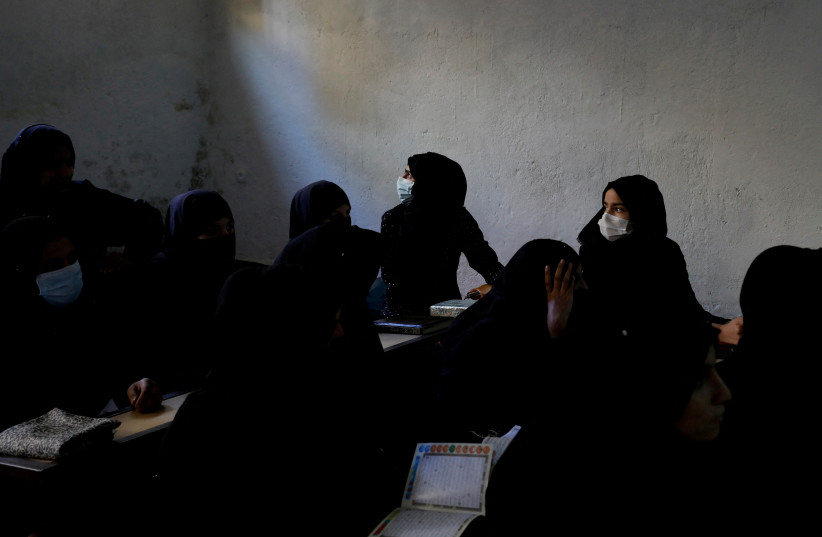The Afghan Taliban flatly rejected the UN’s recent report on violations of women’s rights in Afghanistan.
For more stories from The Media Line go to themedialine.org
In a conversation with The Media Line, chief Taliban spokesperson Zabihullah Mujahid characterized the report as a “manifestation of Western propaganda aimed at tarnishing the image of the Islamic Emirate of Afghanistan.”
Speaking to the Human Rights Council on Monday, Richard Bennett, the UN’s top expert on human rights in Afghanistan, condemned the Taliban’s treatment of women and urged countries to declare “gender apartheid” a crime against humanity.
“Grave, systematic, and institutionalized discrimination against women and girls is at the heart of Taliban ideology and rule,” Bennett said.
Afghanistan criticizes the UN report
Mujahid said that the UN report failed to “acknowledge the cultural and religious context of Afghanistan.”

“We adhere resolutely to Islamic laws and principles, including those pertaining to the treatment of women. The Islamic laws protect the dignity, honor, and respect of women,” he said.
He noted that Afghan women work in “almost every government sector.”
“Women are being given all their legitimate rights by staying within the realm of Shariah,” he said.
The Taliban’s treatment of women and girls has long been a source of concern in the international community.
From 1996 to 2001, when the Taliban first ruled Afghanistan, the fundamentalist group imposed rigid interpretations of Islamic law on the state. Women’s rights were severely restricted, including restrictions on movement, education, employment, health care, and access to public life. A strict dress code was also imposed.
Since the Taliban’s return to power in 2021, numerous reports have been made alleging abuses of human rights and women’s rights. Reports have included accounts of harassment and limits on women’s access to education, employment, and movement.
Muhammad Suhail Shaheen, head of the Taliban’s political office, told The Media Line that allegations of women’s rights violations are used cynically “as a tool of pressure” by entities unaware of the reality of women’s lives in Afghanistan.
Shaheen said that 150,000 female healthcare workers are employed by the Afghan government and that 8,000 female entrepreneurs had recently received commercial licenses from the Afghanistan Chamber of Commerce & Investment.
Female employees who had worked for the government before the Taliban returned to power are still receiving salaries even if they are no longer working, he said. He also noted that about 40,000 widows receive a monthly stipend from the state.
Additionally, “some secondary schools for girls, where they get both religious and modern education, are open,” Shaheen said.
He questioned why the West ignores these examples of Afghan women being treated well.
Existing laws should be enforced
New York-based national security and human rights lawyer Irina Tsukerman criticized the UN’s strategy of moving to declare “gender apartheid” a crime against humanity.
“There is no need to create new laws when existing laws are not being enforced,” she told The Media Line. “Equal treatment of human beings is already enshrined in international law as well as the constitutions of many member states.”
She dismissed the proposal as “virtue signaling” that would have little effect, especially as the Taliban are increasingly recognized as the legitimate government of Afghanistan.
“Women need access to practical empowerment and resources, and the Taliban need to be pressured into adopting different policies—or else frozen out until the point of political collapse,” she said.
On the other hand, Arash Yaqin, a former UN adviser for the Afghan Foreign Ministry who is now based in Washington, applauded the UN’s decision to introduce new terminology in reference to Afghanistan’s treatment of women.
The “human rights abuses by the Taliban over the last 20 months necessitate a reevaluation of the United Nations’ existing catalog of human rights violations terms.”
Arash Yaqin
The “human rights abuses by the Taliban over the last 20 months necessitate a reevaluation of the United Nations’ existing catalog of human rights violations terms,” he told The Media Line.
He said that Afghanistan’s current gender policies are uniquely egregious, noting that the Taliban have “embarked on a systematic campaign to curtail gender rights and regulate new laws that prohibit the participation of women and girls in all aspects of social life.”
The Organization of Islamic Cooperation, an intergovernmental organization with 57 member states, most of which are majority Muslim, has consistently called on the Taliban to reopen girls’ schools in Afghanistan, Yaqin said. He said that those resolutions represent an indirect condemnation of Afghanistan by the Muslim countries of the world.
In addition to criticism from other Muslim nations, “the media’s coverage, the active presence of the Afghan women diaspora in the West, and the prevailing public opinion further highlight why the UN can’t overlook the Taliban’s gender apartheid policies,” he said.
Speaking from an undisclosed location, Freshta Rehmani, who was once a professor in Afghanistan, told The Media Line that the situation for Afghan women is bleak.
“The reemergence of the Taliban in Afghanistan has brought forth immense challenges and a profound sense of despair, particularly for working women across the nation,” she said.
She explained that Afghan women who had previously managed to pursue educational opportunities and professional careers now face marginalization, silencing, and the denial of basic rights.
“After years of progress and hard-fought gains, we find ourselves confronted with a stark reality that threatens to erase our rights, freedoms, and aspirations,” she said.
Rehmani called on the international community to advocate for the rights of women in Afghanistan, describing Afghan women as “resilient, determined, and united.”
